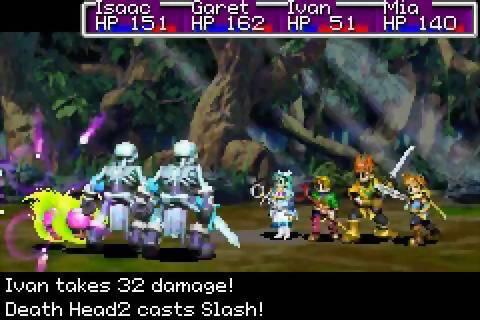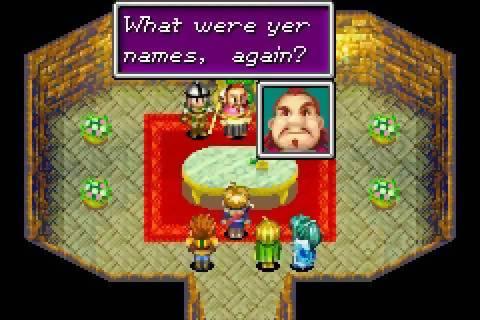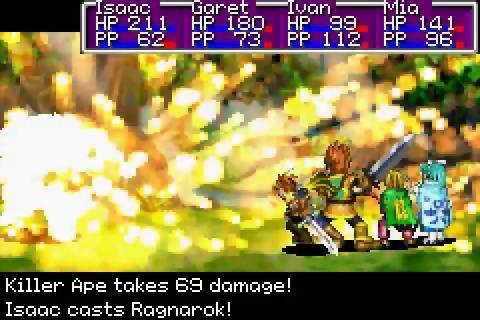
As Golden Sun turns 21, Nintendo is in a new JRPG golden age. It’s time for a reboot
Want to feel old? As of today, August 1st 2022, Golden Sun is old enough to buy a beer in the US. There is now more time between the release of Golden Sun and the present day than there is between the first Japanese release of the NES (as the Famicom) and Golden Sun’s release date. Golden Sun is getting old; but it’s deservedly still beloved.
This Game Boy RPG series is, in a sense, descended from role-playing royalty. Developer Camelot Software Planning began its life as Sonic! Software Planning, and partnered with Sega to launch a little role-playing series called Shining Force. For years, the studio that’d become Camelot crafted several entries in this series, playing second fiddle to Phantasy Star despite its high quality.
In the late nineties and early 2000s, a newly-renamed Camelot forged a close relationship with Nintendo, where it began to build what it is now best-known for: sports games starring everybody’s favorite plumber. But buried amongst a cavalcade of tennis and golf were two real RPG gems - 2001’s Golden Sun, and 2002’s Golden Sun: The Lost Age.
Every now and then Golden Sun comes up in chatter between RPG Site’s contributors, and every time someone is quick to point out that the first game on its own isn’t exactly a perfect genre classic. But taken as a pair these two titles - released back-to-back, with one continuous story, and even a data transfer between games - are a magnificent little slice of RPG genre history, and certainly some of the best games on the GBA.
There’s a lot of charm to these games. I loved the traversal puzzles, which gave you a chance to use your character’s powers outside of battle - something that was surprisingly rare in this era of the genre. I was thrilled to see the two games tell the same story but from opposite perspectives - giving you a chance to play as the ‘bad’ guys, a concept the studio had tried before with Shining Force III.
I loved the battle perspective, where a swirling camera and clever staging not only made battles feel dynamic, but also made it feel like the GBA was pushing out 3D visuals. I love that even though the battle visuals were sublime in their dynamism for a GBA title, the bottom of the screen was dedicated to thrilling battle text in the style of old-school text-based RPGs. “Isaac’s sword lets out a howl! Vorpal Slash!”

And then there’s the music. Who doesn’t remember that battle theme? Regular Camelot collaborator Motoi Sakuraba had form in putting out musical bangers at this point, to be fair - the Game Point music from Mario Tennis is etched into my brain - but Golden Sun is him at the first height of his powers - the second of which came when he defined the musical landscape of Dark Souls a decade later.
But, I digress. The point is, Golden Sun and The Lost Age are great. A Nintendo DS sequel titled Golden Sun: Dark Dawn, now itself 12 years old, was decent - but struggled to find the same magic or the same level of critical acclaim as its predecessors. And with that, the sun appeared to set on the Golden Sun series.
The time has never been better for a renaissance, however. Nintendo is currently in the grip of a new role-playing golden age; one that I’d argue is gradually creeping ever closer to the legendary quality of RPGs on the SNES.

Fire Emblem suddenly became massive thanks to the unexpected popularity of Awakening and successive winners from then on. Monolith Soft has escaped the fate of Camelot - drawn in to help out on other Nintendo IP, including some sports games - but also allowed to develop its own full-fat RPG franchise, most recently delivering a rare RPG Site 10/10 in the excellent Xenoblade 3. More than this, though, Nintendo seems intent to continue investing in role-playing titles in general, signing co-development and timed exclusivity deals with the likes of Square Enix for games such as Octopath Traveler and Live A Live.
It feels a far cry from the Nintendo of old, who seemed to often consider RPGs too complicated, too long, too hardcore, and even too slow to receive full-throated support.
Despite this, Golden Sun, a unique franchise with similarly singular potential, remains untouched for over a decade now. And Camelot, a storied RPG studio of the 90s, hasn’t released anything that isn’t a game about Mario playing a real-life sport for over a decade, too.

In fact, Golden Sun makes up three of the five games that’s seen Camelot outside of the Mario Sports mines over the last 23 years. The other two games are non-Mario sports games. One might argue that the studio has lost it, but it still shows RPG aspirations, such as with an RPG-lite story mode in the most recent Mario Golf game. The desire to make a role-playing game is clearly still there.
So, as Golden Sun turns 21 and as Nintendo enjoys unprecedented success in the genre, my thoughts return to this series - and how it deserves a revival. Perhaps a new game is a bridge too far - but some sort of enhanced remake of the first two titles, the complete story bundled together as one for the first time, makes a lot of sense. Perhaps Nintendo could license or partner with Nintendo to use the HD-2D technology? Perhaps the games could feature a similar style, but rendered in 2D? Honestly, I’d take anything.
Or they could go forward. Dark Dawn ends on a cliffhanger that’s vague enough that it could lead to a soft reboot of the series.
Whatever the format, Golden Sun deserves another chance. It deserves to come back. Hopefully its continued RPG success on Switch leads Nintendo give Camelot a shot.